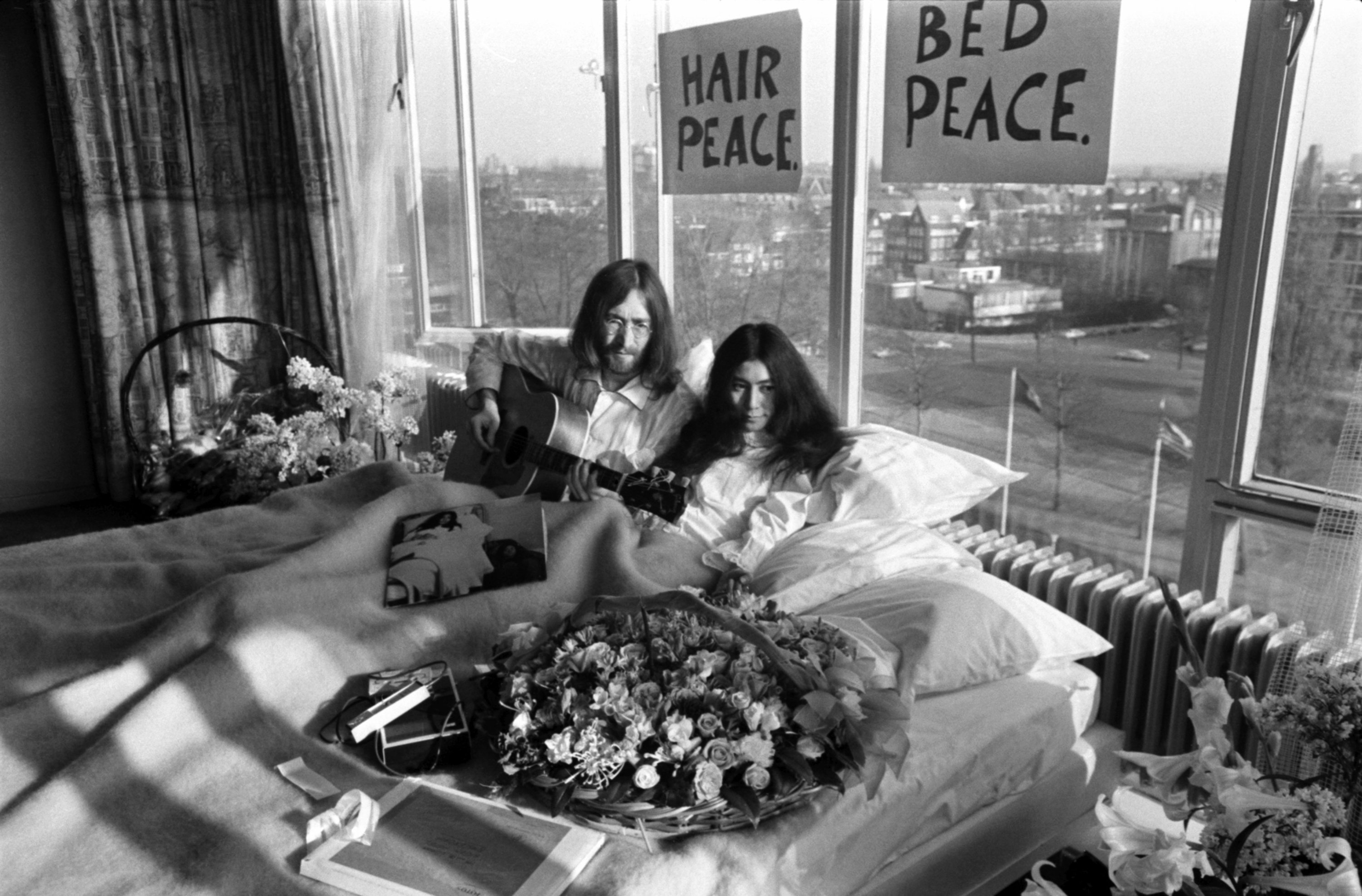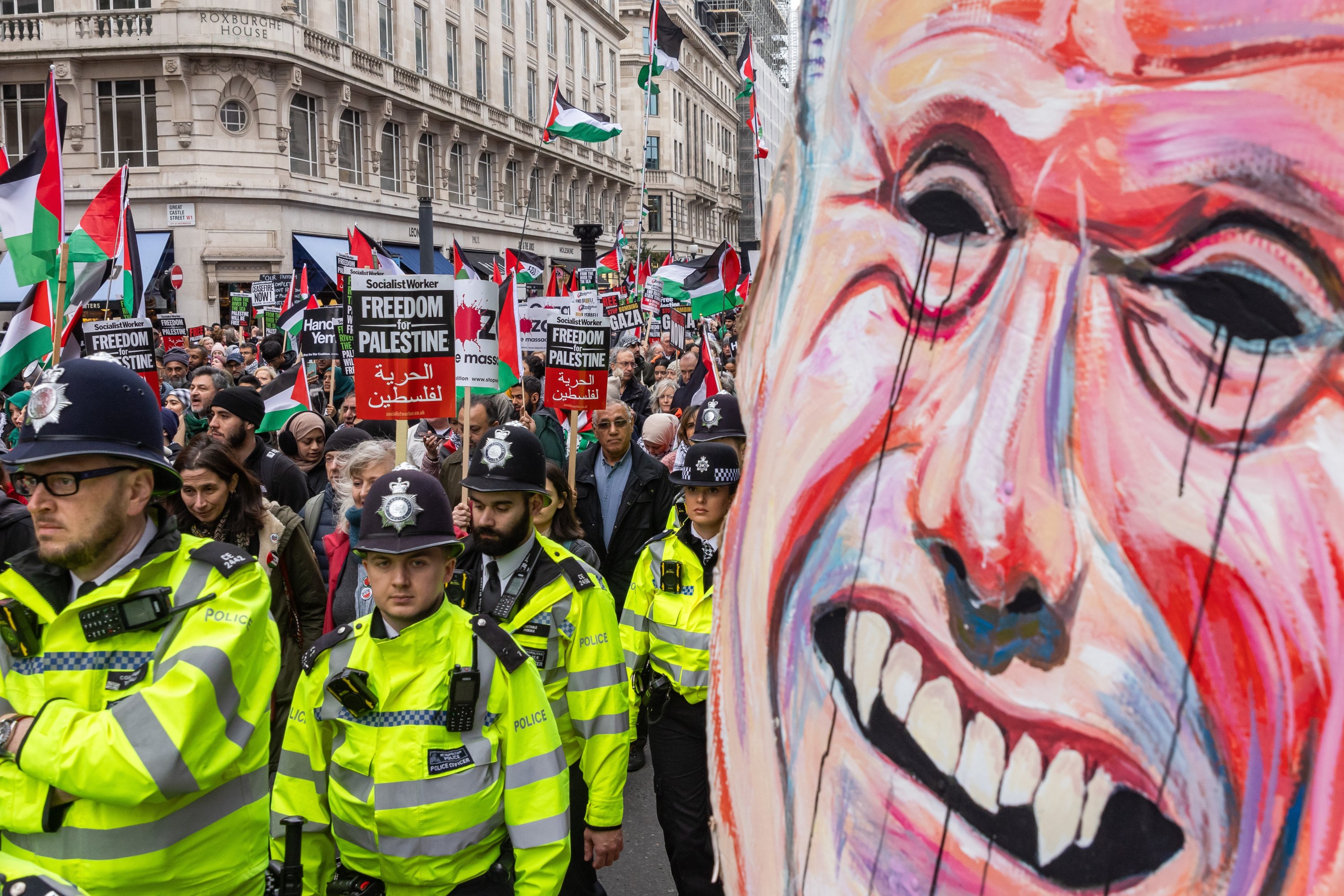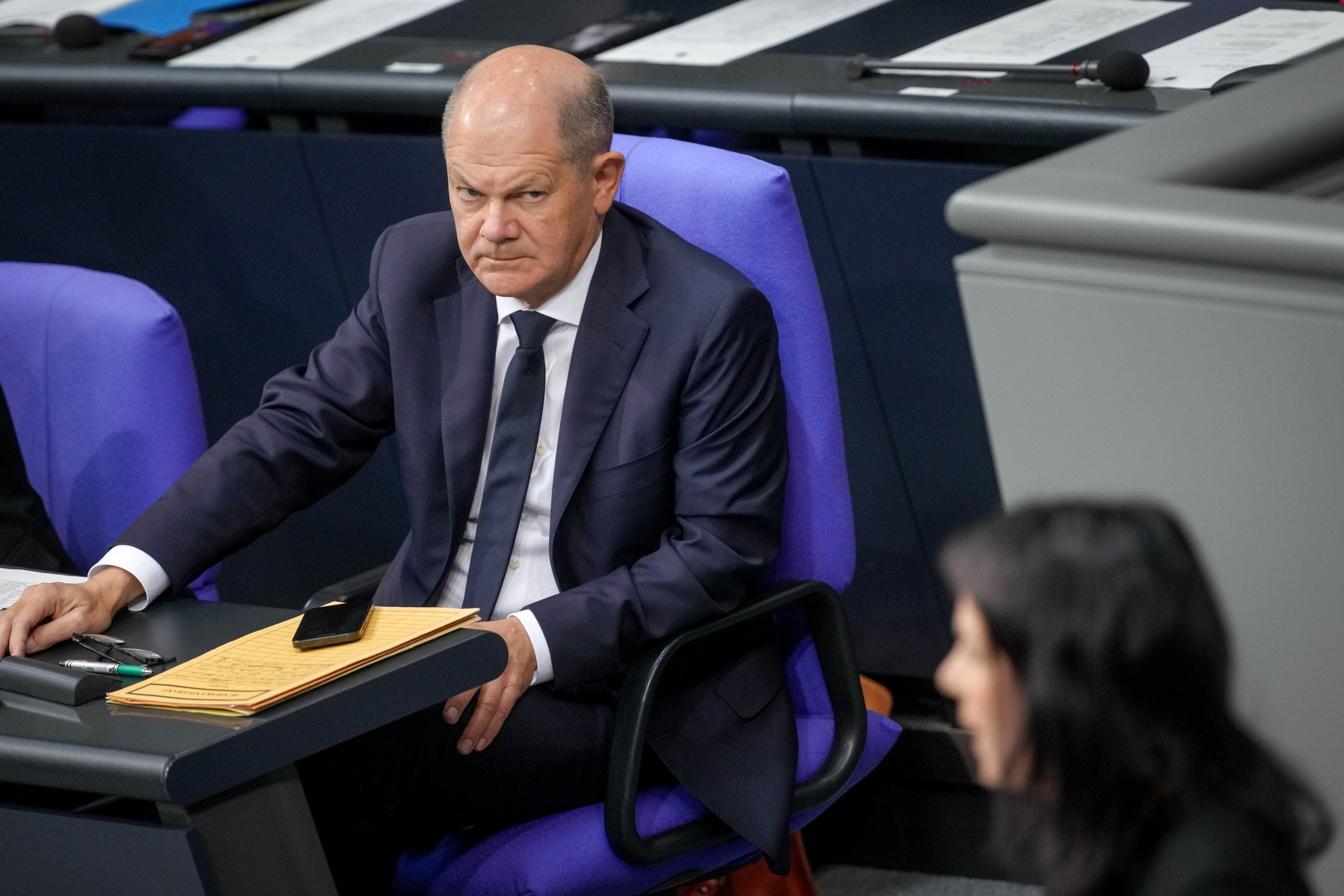© Turkuvaz Haberleşme ve Yayıncılık 2026
Whenever I hear the word “naivety,” I think of John Lennon. The reason is the "Bed-In for Peace" protest he started with his wife Yoko Ono in 1969. Famous photos must have come to your mind, but what about a melody? Did one come to you? For me, it did.
In the summer of 1969, the young and eccentric newlyweds decided to protest the Vietnam War in an extraordinary way – radical, nonviolent and designed to become a media event. The plan was simple: the couple would protest by lying in bed in the honeymoon suite of the Queen Elizabeth Hotel in Montreal and the Hilton Hotel in Amsterdam, where the press and activists could freely come and go. Intriguing, right? It caught the attention of big names like Canadian Prime Minister Pierre Trudeau, other politicians, celebrities and international journalists. The iconic image remains: Lennon and Ono, dressed in white, with “Hair Peace” and “Bed Peace” signs behind them, lying down with the Montreal and Amsterdam skyline in the background, staring at the cameras with a strange calmness.
Accompanying this image, as I mentioned earlier, is a melody – Lennon’s famous song, “Give Peace a Chance,” which later became an anthem at anti-war protests.
On June 1, 1969, Lennon picked up his acoustic guitar and repeated, “All we are saying is give peace a chance.” With the press there, the song reached millions in days. It became a symbol of the absurdity of war and the simplicity of peace, calling everyone to unity. Outside the hotel, young people gathered with guitars, hoping for peace.

The song captured the feelings of a generation tired of war. This was a generation longing for peace, fed up with the U.S.' bloodthirsty policies, and believing the world deserved peace, far removed from violence – though we must exclude those sent to war and killed.
Lennon was a peace lover, often categorized under the global left, though I personally reject these labels, as the world relies on such categories for communication. He and his wife protested with a modest, symbolic act and created an anthem for peace. Naive? Right?
But where is that naivety now? Look around – it's gone.
I found myself stuck on this word while thinking about the ongoing war in Gaza. On Oct. 7, 2023, we woke up with the breaking news reporting hundreds were killed in a sudden Hamas attack in Israel – a development that left the whole world stunned. Israel directly retaliated. And the war began.
It is no secret that Israel loves war and does not hesitate to kill anyone at home or in its neighboring regions when it comes to the wars it favors. It has no war ethics or mercy – nothing. Since its creation, the country has been run by bloodthirsty decision-makers. In Tel Aviv, no pro-peace leader has sat on the throne. They haven’t refrained from maintaining their expansionist policies and have perpetually targeted countries surrounding them. Palestine, however, has always been their favorite target. They have organized countless operations there, from blockades to intelligence plots, from invasions to murders.
After the shocking Hamas attack, Israel retaliated. Since then, it has killed tens of thousands. It starved people, and so on. The innocent were killed. Children were killed. Women were killed. The elderly and sick were killed. Animals were killed. The land was destroyed. None of this, however, satisfied Tel Aviv. Finally, they began attacking Lebanon, Syria and U.N. peacekeepers, and recently announced plans to strike across the Middle East. It was a demand for a wider war – plain and simple. Israel loves war, and it loves the wider war idea more.

While we are familiar with Israel’s habitual love of war, an unfamiliar reality has now emerged: a surprising shift in the Palestinian stance within the European left. As Israel continues to escalate civilian deaths and violate human rights, some left-wing leaders and organizations in Europe – thank God, though not the entire left – are not raising their voices against the pro-war side. I refuse to excuse this stance. If we lose the left on this issue, what will we have left? There is no way to believe that a leftist political sympathizer or public figure could align themselves with pro-war rhetoric. It’s baffling. Lennon and naivety – that’s where my mind gets stuck. Please, agree with me – this isn’t romanticizing.
Let's look at Keir Starmer, then-only leader of the U.K.'s Labour Party, but not yet prime minister. In a program on LBC radio, when asked about Israel cutting off water, food and energy to Gaza, he said: “Israel has the right to do this. This is an ongoing process. Of course, everything must be in accordance with international law.”
During a visit to the South Wales Islamic Centre, Starmer was accused of being “Islamophobic.” The Labor Party, a representative of marginalized groups and pluralism, being tied to Islamophobia? A strange juxtaposition.
Humza Yousaf, then the prime minister of Scotland, also criticized Starmer in an interview with Middle East Eye. In early 2024, Yusuf wrote a letter to Starmer urging Britain to push for a cease-fire in Gaza. The letter was also sent to then-Prime Minister Rishi Sunak. Neither replied. One wouldn’t expect Sunak, a defender of centrism and capital, to oppose the war; in an asymmetrical conflict, Sunak and those like him rarely side with the “weak.” But what about Starmer? A shameful situation. Yousaf said he wasn't surprised by the lack of response, adding that even if Starmer had replied, it likely wouldn’t have differed from his current stance.

In November 2023, the U.K. Parliament debated a Scottish National Party (SNP) amendment calling for an immediate cease-fire in Gaza. The motion was rejected by 294 votes to 125. Not surprising – the Israel lobby and the U.K. are quite close.
However, 56 Labour MPs defied the party leadership and voted for the cease-fire, a significant act of dissent against Starmer's stance on Israel-Palestine. Eight shadow ministers who supported the cease-fire resigned. Starmer signaled that shadow ministers backing the cease-fire would be dismissed. What a leader.
What about Annalena Baerbock, Germany’s foreign minister? Baerbock, as is well known, comes from Germany’s Greens party, a cornerstone of the European left. As someone who holds one of the highest positions in the state and shapes Europe’s foreign policy, she’s a politician with deep roots in leftist tradition. She was likely raised with those values, seen through that lens.
When asked about Israel’s massacre of civilians, three days after Hamas’ indefensible attack, on Oct. 7, this was her response: “Europe as a whole stands by Israel.” She justified Israel’s actions by claiming Hamas used civilians as shields. Yet, at the same time, Israel bombed a hospital, killing hundreds.
At some point, I can understand Germany’s support for Israel, especially considering the influence of the Israeli lobby after World War II. Germany plays a central role in spreading that influence across Europe. But what about the foreign minister who comes from a left-wing tradition? She later lashed out at Israel's aggressive actions on several occasions, but the narrative had been already shaped. Plus, even Benjamin Netanyahu, the strategic mind behind the killings, publicly or diplomatically condemn the killings.

Speaking of Greens, there is another heartbreaking detail from the European Green Party (EGP), also referred to as the European Greens, a transnational political party that “brings together national parties from across the European continent that share the same Green values and political priorities: the climate and environment, social justice, wellbeing, peace and democracy.”
A post on the official website dated Dec. 2, 2023 – the same day thousands were already massacred in Palestine – states: “Israel has the right to defend itself, especially when faced with such brutal and unprecedented violence. The use of force must be in full adherence with international law and the principle of proportionality.”
The “right to defense,” unbelievable.
Unfortunately, this pro-Israel bias can also be seen at the societal level. Aside from trolls and fake accounts, we've frequently heard the term "right to defense" on social media from some left-wing accounts – despite the expectation that, based on their own traditions, they would advocate for peace.
It has long been argued that the left in Europe has shifted direction, tendency and face. Some even say it is shedding its skin. If we were to liken it to a spectrum, political views are being tossed from one end to the other. You don't need to be a political scientist to see this. It’s a fact anyone following the daily news can recognize. In short, stating the obvious would be a waste of time. So, let’s leave the volatile nature of the political spectrum to the political scientists. But everyone has the right to critique the left's turn to the right.
Encouraged by this, I feel a journalistic duty to criticize the European left in the context of the Gaza issue. We must record this in history with sincere regret.
In the past decade, we have seen Europe’s political climate shift toward populism, with the right, center-right or far-right taking hold across the continent. Even in countries where the left has lately gained ground, the right still looms like the sword of Damocles over European citizens. In today's Western-dominated global politics, these trends in the West inevitably spread to other countries, slowly or quickly, changing their political climates. Simply put, anything in major European politics is related to the political fate of other countries.
And yet, here we have a left that has shifted to the right. While human rights were openly violated and the social order was brutally transformed in Gaza, the European left, typically siding with the underdog, has positioned Israel as a country with “the right to defend” itself. They claimed to always support Gaza on this basis. In the end, they pointed to international law but never failed to offer a subtle defense of Israel between the lines. Steimer or Baerbock are just examples, though this article isn’t about him or her.
As I mentioned, the left is known for siding with the oppressed – that’s how societies perceive it, and that’s why many adopt this political stance.
Let's look at Türkiye, for example. During the so-called “generation of 1968,” the historically famous leftist movement in Türkiye supported persecuted Palestinians and played a major role in raising awareness across the country. Back then, some prominent left-wing figures even went to Palestine and received training there. These Turkish leftists who joined Palestinian camps became legendary. Today’s Turkish left takes pride in this history and often reminds conservative politicians, who now focus more on Palestine, that it was they who first brought Palestine to the country’s political agenda.
However, the Turkish left now faces an ontological crisis, much like the European left. Unfortunately, they are no longer as vocal in supporting Gaza and Palestine as the Turkish conservatives are. This is a point of contention even among leftists in Türkiye, some of whom I know well. It is a critical issue that demands reflection and internal reckoning.
Since this is my country, I wanted to share an observation I have seen firsthand. But it would be unfair to criticize only the Turkish left.
In this political climate, the unfortunate shift of the left toward the right – the left once seen as the hope of the world’s people, pro-peace, anti-war, standing against mass murder and prioritizing human rights – is heartbreaking.
This isn't just about Gaza. We're witnessing a broader global trend: The left is moving closer to the center of power. Political lines are blurring. The center has already absorbed the right, bringing with it money and influence. Now, the left, which has resisted for so long, is also poised to be swallowed by the center. This is a political vortex – a dangerous gamble that should not have been taken.
The left, weakened and increasingly devoid of principles, is inadvertently playing into Israel's hands, fueling the demand for a broader Middle East conflict. While Israel is undoubtedly the primary aggressor in this war, it is equally a crime to either actively or passively support it. Passive good can, at times, unintentionally serve evil. Unfortunately, this is the reality.
The European left must urgently reassess its stance on the Gaza conflict, confront its sense of betrayal and issue a strong condemnation of Israel. Only then can calls for peace carry any real meaning. The left still has a significant base in Europe. Guiding these supporters in the right direction could benefit both global citizens and diverse political viewpoints, while also helping build public opposition to Israel's war.
After all, this war is an atrocity.
What, then, is the purpose of the European left if it cannot respond to Israel’s aggression in a meaningful way? They should focus on defending the rights of peace advocates, not staying silent or complicit in the face of injustice.
As George Orwell once said, "Pacifism is objectively pro-fascist." Would he smirk at today’s selective pacifism – anti-war, except when Israel’s involved? Maybe.
By the way, I have no doubt that millions of left-wing individuals, who have been calling for peace since the beginning of the war and have taken various active or passive actions toward that goal, will understand me. I’m certain that this criticism aligns with the kind they often voice loudly and will agree with. Please let my words reach their true target.
And a friendly note to all of us, mostly to leftists in Europe: All wars are bad, all wars are bad, including the one in Gaza. So, please give peace a chance.
